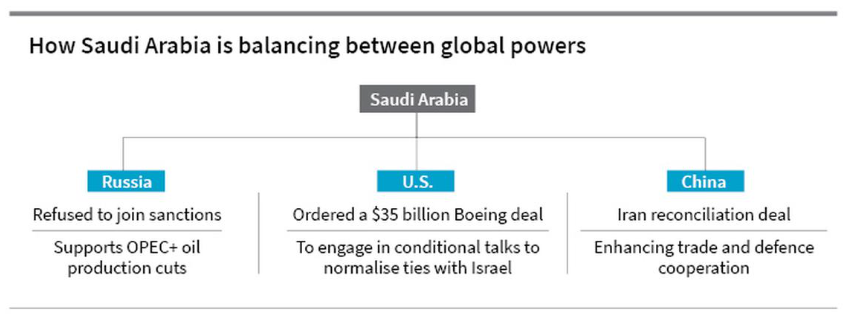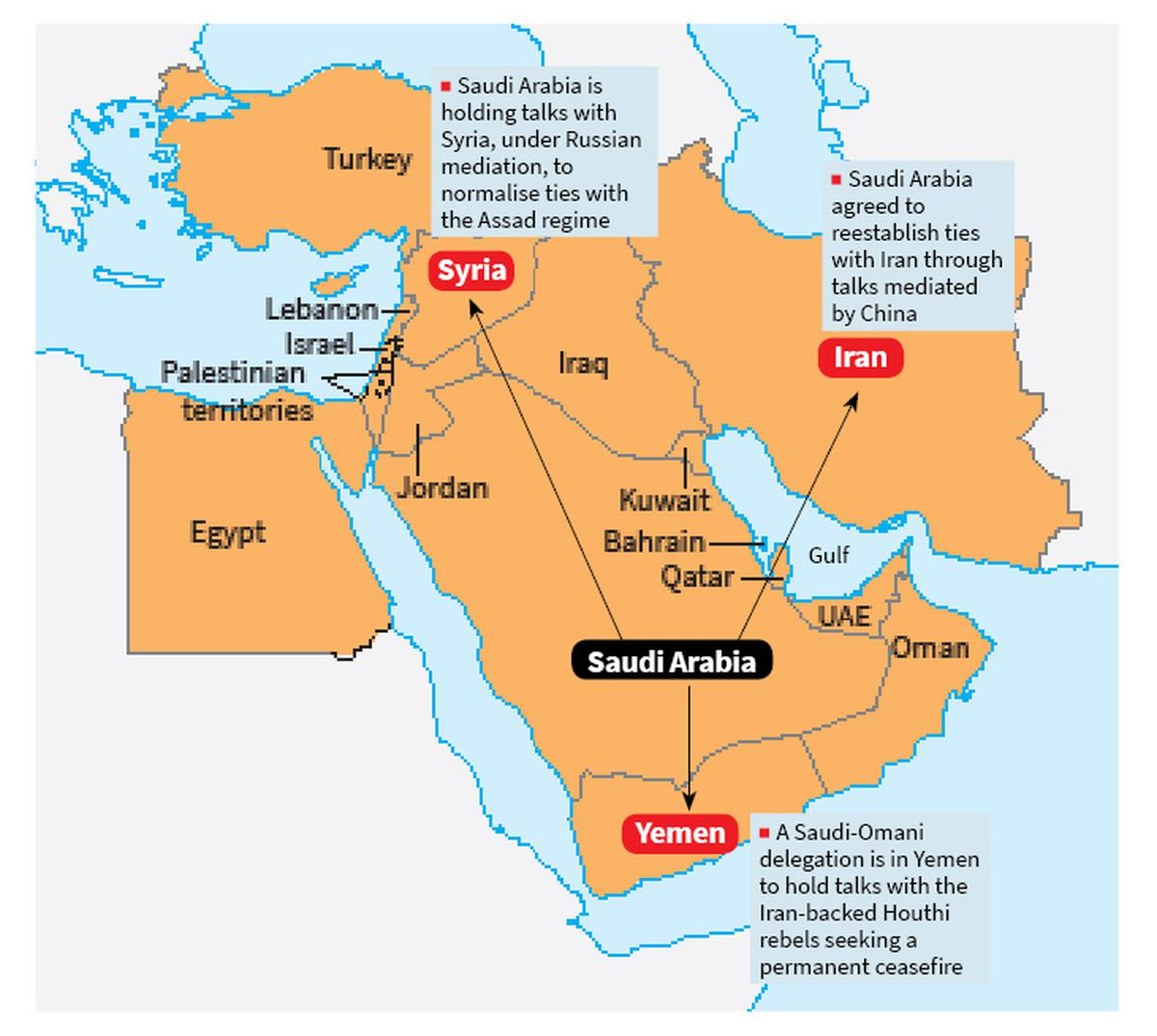Changing Foreign Policy of Saudi Arabia | 15 Apr 2023
For Prelims: OPEC+, Neighboring countries of Saudi Arabia
For Mains: Implications of Saudi Arabia's New Foreign Policy, increasing influence of China in west asia
Why in News?
Saudi Arabia is making a significant shift in its foreign policy as it moves away from its aggressive stance towards Iran and seeks to create balance between great powers while also transforming its own economy.
How is Saudi Arabia's Foreign Policy Changing?
- Changing Stance Towards Iran:
- Saudi Arabia's foreign policy had always centered around Iran, resulting in proxy conflicts across the region. It's stance, in the past, has always been aggressive towards Iran.
- However, recently Saudi Arabia announced a deal, after China-mediated talks to normalise diplomatic ties with Iran.
- There has been a shift from strategic rivalry and proxy conflicts to tactical de-escalation and mutual coexistence with Iran.
- Balancing Ties with Global Powers:
- Saudi Arabia has also been trying to balance between the US, its largest arms supplier, Russia, its OPEC-Plus partner, and China, the new superpower in the region.

- Saudi Arabia has also been trying to balance between the US, its largest arms supplier, Russia, its OPEC-Plus partner, and China, the new superpower in the region.
- Reason for Change in Policy:
- Recent regional bets were either unsuccessful or only partially successful.
- Failed regional policies such as for Syria and Yemen, where the Saudi intervention failed to deter the Iran-backed Houthi rebels.
- Also, the Houthis, with their drones and short-range missiles, now pose a serious security threat to Saudi Arabia.
- The US's priority is shifting away from West Asia.
- US's deprioritisation of West Asia, making Saudi Arabia realise that it needs to establish its own autonomy by building loyal alliances with other great powers.
- China, which has good ties with both Iran and Saudi Arabia, offered to mediate between the two, and the Saudi seized the opportunity.
- Recent regional bets were either unsuccessful or only partially successful.
- Implications on US-Saudi Relations:
- Saudi's changing foreign stance, however, does not mean that it is moving away from the US.
- The country remains Saudi Arabia's largest defence supplier and plays a major security role in the region.
- Saudi Arabia is also trying to develop advanced missile and drone capabilities to counter Iran's edge in these areas with help from the US and others.
- It is rather, just trying to use the vacuum created by the U.S. policy changes to autonomize its foreign policy.
- The country remains Saudi Arabia's largest defence supplier and plays a major security role in the region.
- US’ Response: Though the U.S. has publicly welcomed the Saudi-Iran rapprochement, it raised its concerns to the Crown Prince of Saudi about being “blindsided” on the Iran deal.
- The US largely remained as a spectator in China and Russia led mediation talks, especially considering its huge military presence in the region and the fact that the US had been part of almost all major realignments.
- Saudi's changing foreign stance, however, does not mean that it is moving away from the US.
How will Saudi's Changing Policy Affect the Region?
- Saudi Arabia's talks with Syria and the Houthis are part of a bigger picture of Saudi-Iran rapprochement.
- Ending the Yemen war through a settlement with the Houthis would give Saudi a calmer border and allow Iran to retain influence in Saudi's backyard.
- These agreements could bring some stability across the Gulf, but tensions between Israel and Iran could impact this.
- Saudi also needs to maintain autonomy without irking the US, who may not be happy with Syria being re-accommodated into the West Asian mainstream.
What is at Stake for India?
- Saudi Arabia is an important player in the Middle East, and any significant changes in its foreign policy could impact India's relations with other countries in the region.
- It can lead to creation of China-Pakistan-Saudi Arabia.
- India maintains cordial relations with both Iran and Saudi Arabia and plays a role in maintaining peace and stability in the region.
- Normalizing ties between these two countries could help India in its efforts to promote peace and security in the region.
- However, Chinese mediation between Iran and Saudi will create challenges for India as it will contribute to increasing Chinese influence in the region.
- India needs to be vigilant about the increasing Chinese influence in the region and work towards securing its strategic interests in the Middle East.

